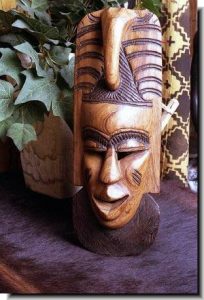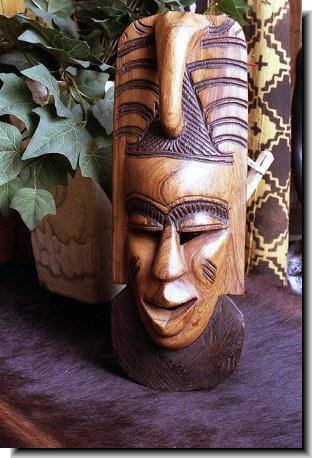 by Alagi Yorro Jallow.
by Alagi Yorro Jallow.Mamudu: The Netherlands government has unambiguously authorized to return of more than 100,000 looted colonial artifacts from Dutch museums to countries they stole them at the height of Dutch colonization and continued occupation of colonies.
Mamudu: Will Great Britain ever acquire the moral courage to do France and Netherlands and other colonial masters likewise. Do their museums return stolen artifacts from the Gambia and in other former British colonies?
Mamudu: Sometimes ago, I went to the Metropolitan Museum of Arts in Manhattan, New York, one of the most comprehensive African art collectors in the United States. The collection ranges from ancient artifacts to contemporary pieces, profiling a historical breadth of works produced from numerous kingdoms, eras, cultures, and empires. The museum exhibits a detailed variety of African art, profiling various forms of rock art, architecture, basketry, and portraits of African leaders, to name a few, and got more information about the treasure plundered from the Pyramids of Meroe.
Mamudu: The stolen African treasures cannot be returned to Africa, to the bonafide African people, because it was stolen “legally!” Like the Sudan, the Gambia and other British colonies were already under British colonial occupation when the treasures were stolen. Thus, the colonial government authorized the expropriation of the treasure of the African heritage.
Mamudu: recently, in the Netherlands, a colonial repatriation committee released a report that advised complete “recognition and rectification of injustices” borne out of colonialism and asked Dutch museums to return artifacts stolen by Dutch colonialists to countries such as Sri Lanka and Indonesia. The Netherlands’ most famous museums — including Amsterdam’s Rijksmuseum and Tropenmuseum — backed the report, vowing to return more than 100,000 exhibits taken by force during colonial times.
“If it does not belong to you, then you must return it,” the author of the report, Lilian Gonçalves-Ho Kang You, said. The move follows at least two years of fervent advocacy by Dutch museums to make the repatriation of stolen items a matter of policy in the Netherlands, with the Rijksmuseum director, Taco Dibbits, returning many items to Indonesia already in 2019. “It is a disgrace that the Netherlands is only now turning its attention to the return of the colonial heritage,” he had said at the time. “We should have done it earlier, and there is no excuse.” According to the statement released.
Mamudu: Countries in Europe have debated formalizing repatriation operations for several years now, with France and the Netherlands ahead of the curve. French President Emmanuel Macron was one of the first European leaders to diverge from longstanding understandings of museums and heritage when he told a group of University students in Burkina Faso in 2017, “Starting today, and within the next five years, I want to see the conditions put in place to allow for the temporary or definitive restitution of African cultural heritage to Africa.” This, of course, was the culmination of almost a decade-long push by African countries such as Egypt and Nigeria asking for their artifacts back from European museums. This proactive practice of restitution has become more common in recent years, prompting a wave of European nations to return stolen art, instead of waiting around for countries to make demands.
After Macron’s speech, a committee and a subsequent report were created in France to formalize Macron’s intent, with a clear focus on giving stolen artifacts back to sub-Saharan Africa so the youth in those regions could interact with their history and culture — with the help of stolen artifacts dating centuries — in their own country. It stated, “to fall under the spell of an object, to be touched by it, moved emotionally by a piece of art in a museum, brought to tears of joy, to admire its forms of ingenuity, to like the artworks’ colors, to take a photo of it, to let oneself be transformed by it: all these experiences — which are also forms of access to knowledge — cannot simply be reserved to the inheritors of an asymmetrical history, to the benefactors of an excess of privilege and mobility.”
This caused a frenzy in other European nations, eager to debate France’s new and surprising position and examine their standing on the right side of history. Soon after, the Netherlands’ National Museum of World Cultures (NMWC) vowed to return artifacts proactively by actively identifying the origins of art within their walls and welcoming ownership claims by different countries.
Mamudu: Critics of repatriation have long advocated for a global, encyclopedic view of ownership of art. “Over time, objects so acquired – whether by purchase, gift or portage – have become part of the museums that have cared for them, and by extension part of the heritage of the nations which house them,” reads a 2002 declaration signed by prominent museums of the world, including the Louvre in Paris and the Metropolitan Museum of Art in New York City. The statement essentially invoked the idea that colonial empires served to blur the lines around where one culture began. Another ended, essentially making all art and its ownership hybrid, flexible.
Mamudu: However, UNESCO cannot intervene because the plunder happened when it was legal! Ridiculous! This rationale reminded me of former British Prime Minister Tony Blair’s response when he was asked whether the United Kingdom was ready to apologize for participating in the Trans-Atlantic Slave trade. Unbelievably, he responded that when the slave trade was taking place, it was legal, and so the United Kingdom had nothing to apologize for wrongdoing.

